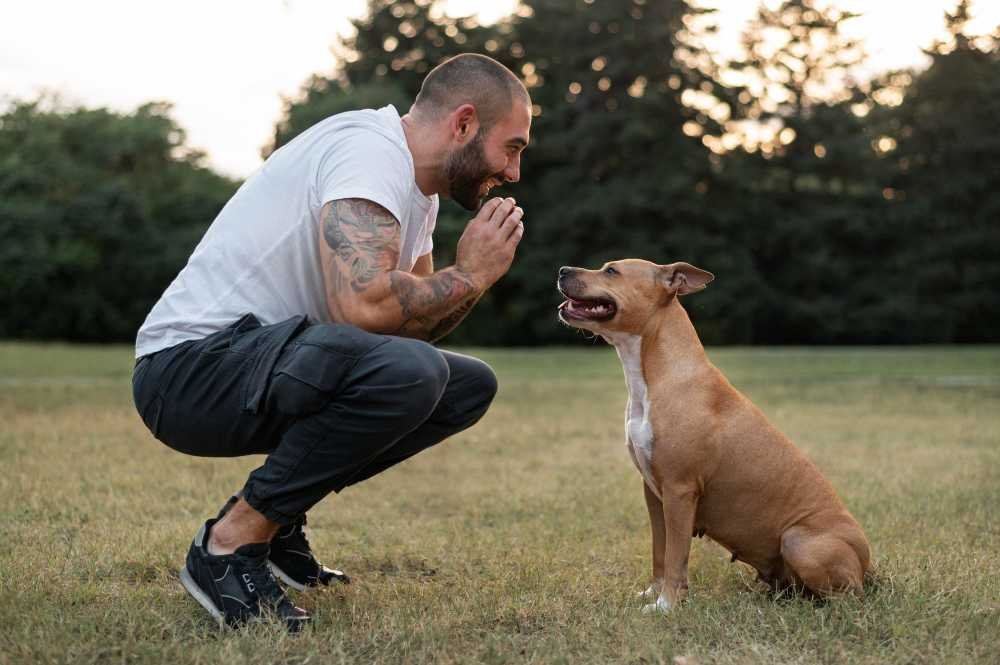One of the amazing abilities of a dog is its ability to communicate, but do you understand what your dog is trying to tell you? Your dog has probably been trying to communicate with you, and you have been communicating right back, whether you recognize it or not. According to this study, a dog can communicate with humans using 19 signals. Dogs communicate with humans through referential signaling, similar to how babies communicate with their parents. So, as a dog owner, do you understand your dog’s behavior and what your dog is trying to communicate?
Why Your Dog Wants to Sit on You
After a long day, you want to sit and watch your favorite show, but your dog keeps sitting on you. Are you wondering, “Why does my dog sit on me when there is so much space around”? Here are a few reasons your dog might want to sit on you. It can be to:
- Spread their scent
Dogs use their scent to mark their territory and communicate with other dogs. So, common dog behavior is a dog sitting in your favorite spaces and rolling around to spread their scent as a way of ownership. If you notice your dog sitting on your favorite sofa or your spot on the sofa, they may be doing so to spread their scent.
When they don’t feel they have spread their scent enough to show you belong to them, they might begin sitting on you to spread their scent further. You can give your dog more attention to build their confidence and make your fur baby believe they are yours. This could stop their need to sit on you.
- Play with you
Dogs love to play, and sometimes, your dog may be sitting on you for fun as a way to play with you. If your dog is sitting on you for fun and to play, they might roll around while on your lap and make playful noises. You can lightly wrestle with the dog, play along, and have fun moments.
- Show Dominance
If you recently adopted a dog, they might want to sit on you to assert dominance and show the rest that they are the top dog. When a dog sits on their human, they feel higher in control. When asserting dominance, a dog will sit on you and bark or growl at others. It is often a one-in-a-while thing, but you should consult your vet if the dog becomes more aggressive when sitting on you.
- Express love
Your dog cannot say “I love you” back, but it can show it by wanting to sit on you. Some dog breeds, like Bichon Frises and Maltese, are loving and become close to their owners. Large breeds like Golden retrievers are also loving and might need some cuddles to express love. If your dog runs to you and sits on your chest or your feet, they may be expressing their love.
- Breed
The type of breed will also determine dog behavior. Some dog breeds are highly affectionate and might feel the urge to be in your space continuously. For example, Great Danes, the gentle giants, are known for their love for children. So, they are more likely to try and sit on your children as a way for them to bond and protect the child.
- Deal with separation anxiety
If you go to work every day and leave your dog at home, they might have separation anxiety. A dog with separation anxiety will want to be by your side throughout and might sit on you when you are about to leave the house to prevent you from leaving. You can consider dog daycare or consult a dog trainer to help your paw friend get over their anxiety.
- Get comfort
When you first get a dog, the excitement sometimes is overwhelming, and you hold your dog on your lap for a few days. Petting your dog on your lap and snuggling with them can teach it to sit on you. They might find a comfortable space on you and continue sitting on you.
- Feel Safe
How many years have you had your dog? Your dog might sit on you because they trust you and feel safe around you. This is common, especially if you have had the dog since they were a puppy, because they know you will protect them.
Why Is My Puppy Panting While Sleeping?
You expect your puppy to sleep peacefully, so it can be a little worrying when they pant in their sleep. Panting during sleep is often nothing to worry about. Though rare, it could sometimes indicate a health condition.
Your puppy may be panting because they are simply a puppy. Age is a great factor in dog behavior while sleeping. Puppies are more playful. Thus, after a day of activities and fun, they are more likely to have dreams that match their activities, hence the panting. Besides, due to their young age, and numerous new experiences, they spend a lot of time in REM (Rapid Eye Movement) sleep compared to adult dogs, making them pant more.
Your puppy might also be panting because they are dreaming. Like young children, puppies have the REM phase of sleep, during which they breathe faster, move their eyelids, and have their muscles twitch. They spend between 20 and 30 minutes in REM, which could sometimes be intense.
The breed of your puppy might also be the reason behind their panting. If your pup is among the brachycephalic breeds- Bulldogs, Boxers, and Shih Tzu, among others, they will pant more in their sleep. These breeds have shortened airways and, thus, pant, snore, or wheeze when sleeping. However, you should be careful enough to know the difference between normal breathing of brachy breeds and Brachycephalic Airway syndrome. If your puppy’s panting is getting in the way of sleep, consult your vet.
Why Is My Dog Barking Excessively?
Vocalization is one way that dogs use to express their feelings. Sometimes, your dog may be barking excessively to let you know they need attention. They might be alerting you that they are bored, frustrated, anxious, or feeling defensive.
Although it is natural for dogs to bark, sometimes, they can bark excessively, which can be frustrating for you and your neighbors. Excessive barking is when your dog barks repeatedly and for prolonged periods. The definition of excessive barking will differ for everyone, but if your dog is suddenly barking excessively, there might be several reasons behind it.
5 Reasons Your Dog is Barking Continuously
First, it could be an indicator of something underlying. For example, your dog might be barking excessively because of triggers, maybe people passing through the property or other dogs around the area. It could also indicate underlying issues such as pain, distress, or fear of something.
Second, your dog may be excessive barking because they are afraid. Yes, you expect your dog to protect you, but like us, they, too, get afraid sometimes. Noises like thunderstorms, fireworks, or lawnmowers might scare your dog, and they may bark excessively to express fear.
Third, your dog might be barking excessively because it is lonely, bored, and frustrated. Dogs are active, and when stimulated or left alone all day without any activities, they might get frustrated and lonely and express it through barking. When expressing boredom, loneliness, or frustration, you might note your dog digging up the backyard or engaging in other activities.
Fourth, the excessive barking could be due to separation anxiety. Continuous barking can indicate that your dog does not like being alone and has separation anxiety. Separation anxiety is often coupled with destructive behavior like inappropriate urination or self-harm, e.g., licking themselves repeatedly until they create wounds.
Lastly, your dog may be continuously barking because they want attention. A mistake we, dog parents, often make is unknowingly rewarding the barking, reinforcing the behavior. For example, if your dog barks when it wants water and quickly fills its dish, you teach them to bark when they need it, and you will get what they want.
How to Tell Why Your Dog is Barking Excessively
You can try and identify the reasons your dog is barking excessively by noticing the following:
- When it happens
- Where the dog is when it barks excessively
- If there is other behavior the dog exhibits when barking excessively
- If the dog barks excessively when it is left alone or when it stays for long without anything to do
- If the barking stops once you engage the dog in exercise or stimulating activities
What to do
Depending on why your dog is barking continuously, you can stop it. However, you need to be patient as it will not happen overnight. Common mistakes dog parents make is shouting at their dogs to get them to stop barking. Unfortunately, this will only stimulate your dog. So, you should speak firmly but calmly. Also, most dogs only understand “Quiet” (if trained). Therefore, yelling at the dog and telling it to “Shut up” will be unfruitful.
You can curb continuous barking by gently but firmly saying “Quiet” until they stop. Once they stop, give them a treat or praise them. Eventually, they will learn when you tell them “Quiet,” they should stop barking and get a treat.
It is also important to keep your dog active and stimulated. A tired dog will be a quiet dog. So, take your fur friend on a walk or a run, engage them in play activities, and visit the dog park if you can.
What to Avoid
Do not ignore the problem hoping it will go away. When a dog does something for a long, they become ingrained in it. Besides, barking gives dogs an adrenaline rush, prompting them to continue as they find it pleasant.
Allowing your dog to continue barking, for example, when the deliveryman arrives, will eventually worsen the habit and make it aggressive when a stranger comes by. So, deal with the excessive barking as soon as you notice it. It also helps to identify the trigger to deal with the barking better.
See your vet if your attempts to curb the barking do not work. Sometimes, your dog may be barking as a way to express pain, and excessive barking might cause some problems or ongoing pain. Therefore, it is important to have your paw friend checked to ensure there is no medical reason behind the barking.
How to Control Barking
Since there are different reasons why your dog may be excessively barking, each reason has a unique remedy.
Fear
If your dog is barking because it is afraid, try limiting the fear factor. For example, if your dog is barking because of a perceived threat from strangers or other dogs, use a fence to limit them from seeing other people or dogs. If you have chain fencing, you can try changing the fence to solid wood. Additionally, you can limit their access to doors or windows to keep them from seeing outside.
Loneliness
If you always leave your dog at home alone when going to work, find activities to keep the dog occupied. Alternatively, you can get someone or another dog to keep them company. Hire a sitter to take your dog on a walk, or use different food dispensing toys to keep your dog active. Consider a dog daycare to have your dog interact with other dogs.
Separation anxiety
This can be hard to rectify on your own. If your dog has separation anxiety, it will need professional help, usually therapy, to help them overcome its anxiety and adopt acceptable behavior to cope.
Attention
If you notice their dish is empty, wait a few minutes after they bark before refilling the water. That way, they will not know their barking was effective. Try to find alternative ways to communicate. For example, you can bang their water dish before filling it. They will understand when the dish makes noise, you will fill it. So, instead of barking, they can push the dish to make some noise to alert you.
You can also use dog muzzles to control barking. Use them only for a short period and when they are under supervision. Here is a list of the best dog muzzles for barking.
Take Away
Dogs try to communicate with us through their actions. Therefore, understanding dog behavior will bring you closer to understanding what they are trying to communicate and can help you care for them better.





